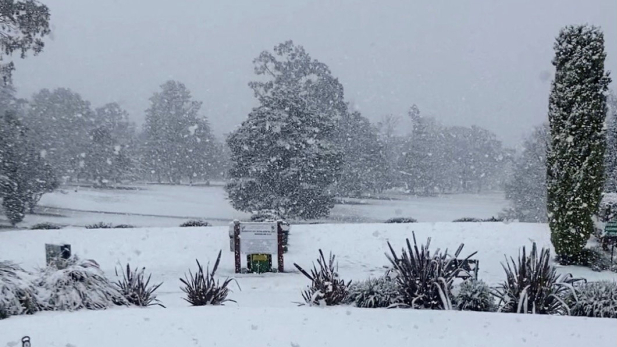Hillary Clinton calls for truth to 'come out' after Epstein testimony
Speaking during a closed-door deposition in New York on Thursday (February), former U.S. Secretary of State Hillary Clinton said she did not “recall...

Several towns in eastern Australia were blanketed with their thickest snowfall in nearly 40 years as severe weather swept through over the weekend.
Authorities reported widespread disruptions, including floods, power outages, and stranded vehicles.
Northern New South Wales saw up to 40 cm (16 inches) of snow on Saturday, the most since the 1980s, while some areas of Queensland experienced snow for the first time in a decade, according to Miriam Bradbury from Australia’s weather bureau.
Bradbury noted that while extreme weather is becoming more common due to climate change, events like this have occurred in Australia’s historical weather records.
“What makes this event stand out is not just the depth of the snow, but its reach across the northern tablelands,” she said.
Emergency services responded to more than 1,455 incidents in New South Wales alone, dealing with storm damage, snow-trapped vehicles, and multiple flood warnings. Tens of thousands of homes lost power overnight, according to the Australian Broadcasting Corporation.
In a tragic development, police said a woman in her 20s was swept away after a car became stuck in floodwaters on Saturday evening. The search continued into Sunday.
The death toll from heavy rains and flooding in Brazil’s Minas Gerais state has risen to 46, authorities said, with 21 people still reported missing. The storms triggered landslides and widespread flooding, displacing thousands across Juiz de Fora and Uba.
The situation in Cuba was heating up and called for restraint following a deadly incident involving a Florida-registered speedboat off the coast of the Caribbean island, the Kremlin said on Thursday (26 February).
Syria’s economy is showing clear signs of recovery, with economic activity accelerating in recent months, the International Monetary Fund (IMF) said on Wednesday.
The United States has deployed the aircraft carrier USS Gerald R. Ford near Israel as part of a growing military build-up amid tensions with Iran, while governments around the world urge their citizens to leave parts of the region.
Venezuela’s Attorney General Tarek William Saab and Ombudsman Alfredo Ruiz tendered their resignations to the National Assembly on Wednesday. Neither official has publicly provided reasons for stepping down.
The death toll from heavy rains and flooding in Brazil’s Minas Gerais state has risen to 46, authorities said, with 21 people still reported missing. The storms triggered landslides and widespread flooding, displacing thousands across Juiz de Fora and Uba.
The administration of U.S. President Donald Trump on Thursday (12 February) announced the repeal of a scientific finding that greenhouse gas emissions endanger human health, and eliminated federal tailpipe emissions standards for cars and trucks.
Tropical Cyclone Gezani has killed at least 31 people and left four others missing after tearing through eastern Madagascar, the government said on Wednesday, with the island nation’s second-largest city bearing the brunt of the destruction.
Rivers and reservoirs across Spain and Portugal were on the verge of overflowing on Wednesday as a new weather front pounded the Iberian peninsula, compounding damage from last week's Storm Kristin.
Morocco has evacuated more than 100,000 people from four provinces after heavy rainfall triggered flash floods across several northern regions, the Interior Ministry said on Wednesday.
You can download the AnewZ application from Play Store and the App Store.

What is your opinion on this topic?
Leave the first comment